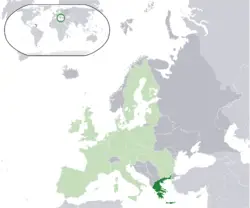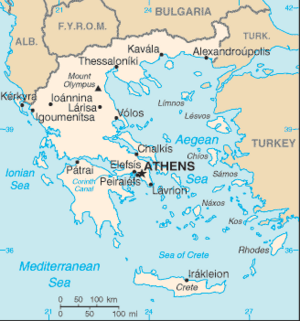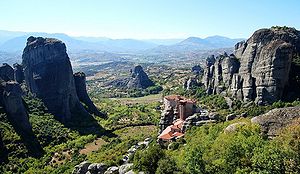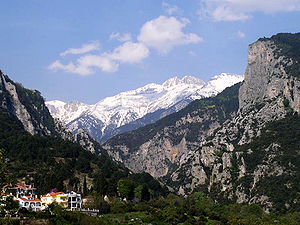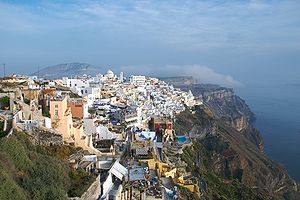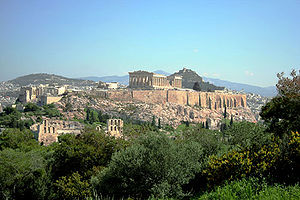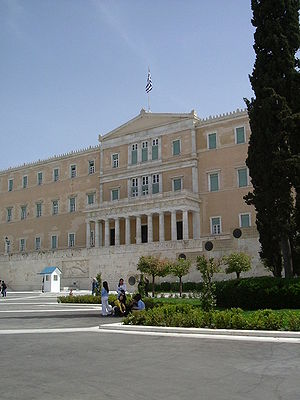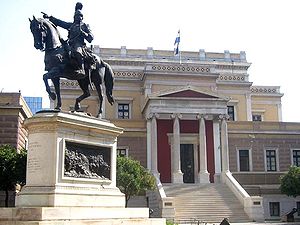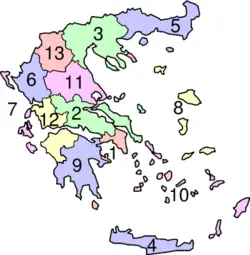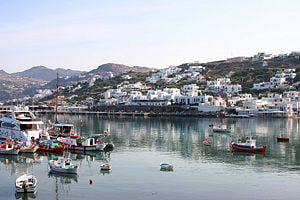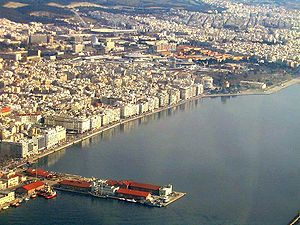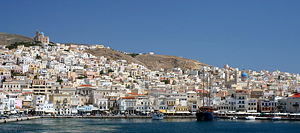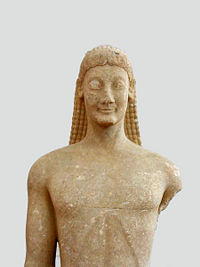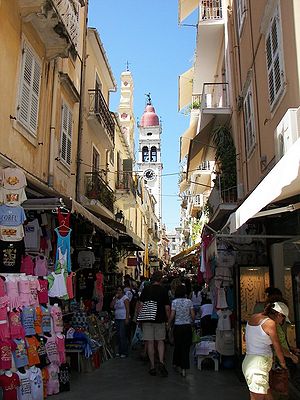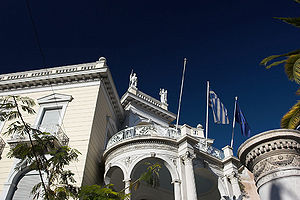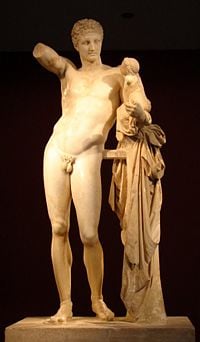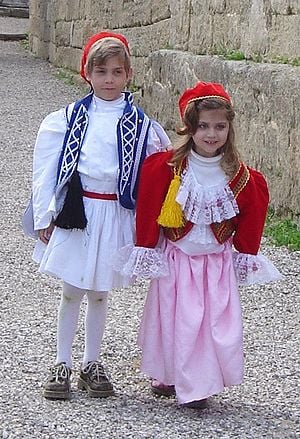Difference between revisions of "Greece" - New World Encyclopedia
Mike Butler (talk | contribs) |
Mike Butler (talk | contribs) |
||
| Line 123: | Line 123: | ||
The shores of Greece's [[Aegean Sea]] saw the emergence of the first advanced civilizations in Europe. [[Minoan civilization| Minoan]] and [[Mycenae|Mycenean]] civilizations, and later Greek [[city-states]], emerged across the Greek peninsula but also on the shores of [[Black Sea]], [[Magna Grecia|South Italy]] and [[Asia Minor]], reaching great levels of prosperity that resulted in an unprecedented cultural boom, expressed in [[Parthenon|architecture]], [[tragedy]], [[drama]], [[science]] and [[philosophy]], and nurtured in Athens under a [[Democracy|democratic]] environment. [[Athens]] and [[Sparta]] led the way in repelling the [[Persian Empire]] in a series of [[Greco-Persian Wars|battles]]. Both were later overshadowed by [[Thebes]] and eventually [[Ancient Macedonia|Macedonia]], with the latter under the guidance of [[Alexander the Great]] uniting and leading the Greek world to victory over the [[Persians]], to presage the [[Hellenistic era]], itself brought only partially to a close two centuries later with the establishment of [[Roman Republic|Roman]] rule over Greek lands in 146 B.C.E. | The shores of Greece's [[Aegean Sea]] saw the emergence of the first advanced civilizations in Europe. [[Minoan civilization| Minoan]] and [[Mycenae|Mycenean]] civilizations, and later Greek [[city-states]], emerged across the Greek peninsula but also on the shores of [[Black Sea]], [[Magna Grecia|South Italy]] and [[Asia Minor]], reaching great levels of prosperity that resulted in an unprecedented cultural boom, expressed in [[Parthenon|architecture]], [[tragedy]], [[drama]], [[science]] and [[philosophy]], and nurtured in Athens under a [[Democracy|democratic]] environment. [[Athens]] and [[Sparta]] led the way in repelling the [[Persian Empire]] in a series of [[Greco-Persian Wars|battles]]. Both were later overshadowed by [[Thebes]] and eventually [[Ancient Macedonia|Macedonia]], with the latter under the guidance of [[Alexander the Great]] uniting and leading the Greek world to victory over the [[Persians]], to presage the [[Hellenistic era]], itself brought only partially to a close two centuries later with the establishment of [[Roman Republic|Roman]] rule over Greek lands in 146 B.C.E. | ||
| − | The subsequent mixture of [[Roman]] and [[Hellenic]] culture took form in the establishment of the [[Eastern Roman Empire]] in 330 C.E. around [[Constantinople]] , to remain a major cultural and military force for the next 1,123 years until the [[Fall of Constantinople|its fall]] at the hands of [[Ottomans]] in 1453. On the eve of the Ottoman era the Greek intelligentsia migrated to [[Western Europe]], playing a significant role in the [[Renaissance|Western European Renaissance]] through the transferring of works by [[Ancient Greeks]] to [[Western Europe]] | + | The subsequent mixture of [[Roman]] and [[Hellenic]] culture took form in the establishment of the [[Eastern Roman Empire]] in 330 C.E. around [[Constantinople]] , to remain a major cultural and military force for the next 1,123 years until the [[Fall of Constantinople|its fall]] at the hands of [[Ottomans]] in 1453. On the eve of the Ottoman era the Greek intelligentsia migrated to [[Western Europe]], playing a significant role in the [[Renaissance|Western European Renaissance]] through the transferring of works by [[Ancient Greeks]] to [[Western Europe]]. |
| − | Through the [[Greek War of Independence]], successfully fought against the [[Ottoman Empire]] from 1821 to 1829, the Greek nascent state was finally recognized under the [[London Protocol]]. In 1827, [[Ioannis Kapodistrias]], a noble Greek from the [[Ionian Islands]], was chosen as the first governor of the new Republic. However, following his assassination, the [[Great Powers]] soon installed a [[Kingdom of Greece|monarchy]] under [[Otto of Greece|Otto]], of the Bavarian [[House of Wittelsbach]]. In 1843, an uprising forced the King to grant a constitution and a representative assembly. Due to his unimpaired authoritarian rule, he was eventually dethroned in 1863 and replaced by Prince Vilhelm (William) of Denmark, who took the name [[George I of Greece|George I]] and brought with him the [[Ionian Islands]] as a coronation gift from [[United Kingdom|Britain]]. In 1877, [[Charilaos Trikoupis]], a dominant figure of the Greek political scene who is attributed with the significant improvement of the country's infrastructure, curbed the power of the monarchy to interfere in the assembly by issuing the rule of [[vote of confidence]] to any potential [[prime minister]]. | + | ===Ottoman rule=== |
| + | Nevertheless, the [[Millet (Ottoman Empire)|Ottoman millet]] system contributed to the ethnic cohesion of Orthodox Greeks by segregating the various peoples within the [[Ottoman Empire]] based on religion as the latter played an an integral role in the formation of modern Greek identity. | ||
| + | |||
| + | ===Greek War of Independence=== | ||
| + | Through the [[Greek War of Independence]], successfully fought against the [[Ottoman Empire]] from 1821 to 1829, the Greek nascent state was finally recognized under the [[London Protocol]]. In 1827, [[Ioannis Kapodistrias]], a noble Greek from the [[Ionian Islands]], was chosen as the first governor of the new Republic. However, following his assassination, the [[Great Powers]] soon installed a [[Kingdom of Greece|monarchy]] under [[Otto of Greece|Otto]], of the Bavarian [[House of Wittelsbach]]. | ||
| + | |||
| + | ===1843 uprising=== | ||
| + | In 1843, an uprising forced the King to grant a constitution and a representative assembly. Due to his unimpaired authoritarian rule, he was eventually dethroned in 1863 and replaced by Prince Vilhelm (William) of Denmark, who took the name [[George I of Greece|George I]] and brought with him the [[Ionian Islands]] as a coronation gift from [[United Kingdom|Britain]]. In 1877, [[Charilaos Trikoupis]], a dominant figure of the Greek political scene who is attributed with the significant improvement of the country's infrastructure, curbed the power of the monarchy to interfere in the assembly by issuing the rule of [[vote of confidence]] to any potential [[prime minister]]. | ||
[[Image:Oil painting of the Greek Parliament, at the end of the 19th century, by N. Orlof.jpg|thumb|left|The [[Hellenic Parliament]], convening as Prime Minister [[Charilaos Trikoupis]] gives a speech, during the late nineteenth century.]] | [[Image:Oil painting of the Greek Parliament, at the end of the 19th century, by N. Orlof.jpg|thumb|left|The [[Hellenic Parliament]], convening as Prime Minister [[Charilaos Trikoupis]] gives a speech, during the late nineteenth century.]] | ||
| + | ===Balkan wars=== | ||
Following the [[Balkan Wars|Balkan Wars of 1912-13]], Greece successfully doubled in territory and population, a challenging context both socially and economically. In the years after, the struggle between the new king [[Constantine I of Greece|King Constantine I]] and his charismatic prime minister [[Eleftherios Venizelos]], over the country's foreign policy on the eve of [[WW I]], dominated the country's political order, and divided the country into two bitterly hostile factions (see [[National Schism]]). | Following the [[Balkan Wars|Balkan Wars of 1912-13]], Greece successfully doubled in territory and population, a challenging context both socially and economically. In the years after, the struggle between the new king [[Constantine I of Greece|King Constantine I]] and his charismatic prime minister [[Eleftherios Venizelos]], over the country's foreign policy on the eve of [[WW I]], dominated the country's political order, and divided the country into two bitterly hostile factions (see [[National Schism]]). | ||
| − | In the aftermath of [[WW I]], Greece fought a bloody and eventually unsuccessful war against Turkish nationalists led by [[Mustafa Kemal Atatürk]] ([[Greco-Turkish War (1919-1922)]], which resulted in a massive population exchange between the two countries under the [[Treaty of Lausanne]]. Instability and successive coup d'etats marked the following era, which was also coloured by the massive task of incorporating the 1.5 million refugees from the [[Asia Minor]] into Greek society. On 28 October 1940 [[Kingdom of Italy (1861–1946)|Fascist Italy]] demanded the surrender of Greece, but the greek administration famously provided the brief response of response of "OXI" ("No"). In the following [[Greco-Italian War]], Greece repelled Italian forces into [[Albania]], giving the [[Allies]] their first victory over [[Axis powers|Axis]] forces on land. The country would eventually fall to urgently dispatched German forces during the [[Battle of Greece]], but occupiers nevertheless met serious challenges from the [[Greek Resistance]]. | + | ===World War I=== |
| + | |||
| + | ===Greco-Turkish war=== | ||
| + | In the aftermath of [[WW I]], Greece fought a bloody and eventually unsuccessful war against Turkish nationalists led by [[Mustafa Kemal Atatürk]] ([[Greco-Turkish War (1919-1922)]], which resulted in a massive population exchange between the two countries under the [[Treaty of Lausanne]]. Instability and successive coup d'etats marked the following era, which was also coloured by the massive task of incorporating the 1.5 million refugees from the [[Asia Minor]] into Greek society. | ||
| + | |||
| + | ===World War II=== | ||
| + | On 28 October 1940 [[Kingdom of Italy (1861–1946)|Fascist Italy]] demanded the surrender of Greece, but the greek administration famously provided the brief response of response of "OXI" ("No"). In the following [[Greco-Italian War]], Greece repelled Italian forces into [[Albania]], giving the [[Allies]] their first victory over [[Axis powers|Axis]] forces on land. The country would eventually fall to urgently dispatched German forces during the [[Battle of Greece]], but occupiers nevertheless met serious challenges from the [[Greek Resistance]]. | ||
| + | |||
| + | ===Post-war recovery=== | ||
[[Image:Karamanlisarrivesinathens.jpg|thumb|[[July 24]] [[1974]]: [[Konstantinos Karamanlis]] arrives in Athens on the French Presidential jet, courtesy of French President [[Valéry Giscard d'Estaing]]]] | [[Image:Karamanlisarrivesinathens.jpg|thumb|[[July 24]] [[1974]]: [[Konstantinos Karamanlis]] arrives in Athens on the French Presidential jet, courtesy of French President [[Valéry Giscard d'Estaing]]]] | ||
| Line 137: | Line 153: | ||
After liberation, Greece experienced a bitter [[Greek Civil War|civil war]] between [[Royalist]] and [[Communist]] forces, which led to economic devastation and severe social tensions between its [[Rightists]] and recently outlawed [[Leftists]]. The next 20 years were characterized by a significant economic growth, propelled in part by the [[Marshall Plan]]. In 1965, a period of political turbulence and the rise of the [[United Democratic Left|center-left]] led to a coup d’etat on [[April 21]], [[1967]] by the [[Greek military junta of 1967-1974|Regime of the Colonels]]. On November 1973 the [[Athens Polytechnic Uprising]] sent shock waves across the regime, and a counter-coup established [[Brigadier]] [[Dimitrios Ioannides]] as dictator. On [[July 20]], [[1974]], as [[Turkey]] invaded the island of [[Cyprus]], using a junta-sponsored coup d'etat in the island as a pretext, the regime collapsed. | After liberation, Greece experienced a bitter [[Greek Civil War|civil war]] between [[Royalist]] and [[Communist]] forces, which led to economic devastation and severe social tensions between its [[Rightists]] and recently outlawed [[Leftists]]. The next 20 years were characterized by a significant economic growth, propelled in part by the [[Marshall Plan]]. In 1965, a period of political turbulence and the rise of the [[United Democratic Left|center-left]] led to a coup d’etat on [[April 21]], [[1967]] by the [[Greek military junta of 1967-1974|Regime of the Colonels]]. On November 1973 the [[Athens Polytechnic Uprising]] sent shock waves across the regime, and a counter-coup established [[Brigadier]] [[Dimitrios Ioannides]] as dictator. On [[July 20]], [[1974]], as [[Turkey]] invaded the island of [[Cyprus]], using a junta-sponsored coup d'etat in the island as a pretext, the regime collapsed. | ||
| + | ===Democracy restored=== | ||
Ex-Premier [[Constantine Karamanlis]] was invited back from [[Paris]] where he had lived in self-exile since 1963, marking the beginning of the [[Metapolitefsi]] era ; a 1975 democratic republican constitution was activated and the monarchy abolished by a referendum held that same year. On [[January 1]] [[1981]] Greece entered the [[European Union]], and has experienced an unprecedented period of prosperity ever since. Meanwhile , Andreas Papandreou had also founded the Panhellenic Socialist Party, or [[PASOK]], in response to [[Constantine Karamanlis]] [[New Democracy (Greece)|New Democracy]] party, and the two groupings have dominated Greek political affairs in the ensuing decades. Under [[Kostas Simitis]]'s stewardship Greece completed its move to the [[Euro zone]] in 2001 and the country successfully organized the [[2004 Olympic Games]] in [[Athens]]. | Ex-Premier [[Constantine Karamanlis]] was invited back from [[Paris]] where he had lived in self-exile since 1963, marking the beginning of the [[Metapolitefsi]] era ; a 1975 democratic republican constitution was activated and the monarchy abolished by a referendum held that same year. On [[January 1]] [[1981]] Greece entered the [[European Union]], and has experienced an unprecedented period of prosperity ever since. Meanwhile , Andreas Papandreou had also founded the Panhellenic Socialist Party, or [[PASOK]], in response to [[Constantine Karamanlis]] [[New Democracy (Greece)|New Democracy]] party, and the two groupings have dominated Greek political affairs in the ensuing decades. Under [[Kostas Simitis]]'s stewardship Greece completed its move to the [[Euro zone]] in 2001 and the country successfully organized the [[2004 Olympic Games]] in [[Athens]]. | ||
Revision as of 07:12, 27 November 2007
| Ελληνική Δημοκρατία Ellīnikī́ Dīmokratía Hellenic Republic |
||||||
|---|---|---|---|---|---|---|
|
||||||
| Motto: Ελευθερία ή θάνατος Eleftheria i thanatos (transliteration) "Freedom or Death" |
||||||
| Anthem: Ύμνος εις την Ελευθερίαν (Ímnos is tin Eleftherían) Hymn to Freedom |
||||||
| Location of Greece (dark green) – on the European continent (light green dark grey) – in the European Union (light green) |
||||||
| Capital (and largest city) | Athens 38°00′N 23°43′E | |||||
| Official languages | Greek | |||||
| Demonym | Greek | |||||
| Government | Parliamentary republic | |||||
| - | President | Karolos Papoulias | ||||
| - | Prime Minister | Kostas Karamanlis | ||||
| - | President of Parliament | Dimitrios Sioufas | ||||
| Modern statehood | ||||||
| - | Independence from the Ottoman Empire |
25 March 1821 |
||||
| - | Recognized | 30 November 1829, at the London Conference | ||||
| - | Current constitution | 1975, "Third Republic" | ||||
| EU accession | January 1 1981 | |||||
| Area | ||||||
| - | Total | 131,990 km² (96th) 50,944 sq mi |
||||
| - | Water (%) | 0.8669 | ||||
| Population | ||||||
| - | 2007 estimate | 11,170,957 [1] (74th) | ||||
| - | 2001 census | 10,964,020 [2] | ||||
| - | Density | 84/km² (88th) 218/sq mi |
||||
| GDP (PPP) | 2007 IMF estimate | |||||
| - | Total | $391.395 billion (30th) | ||||
| - | Per capita | $35,167 (18th) | ||||
| GDP (nominal) | 2007 IMF estimate | |||||
| - | Total | $356.258 billion (27th) | ||||
| - | Per capita | $32,010 (25th) | ||||
| Gini (2000) | 35.42 (low) | |||||
| Currency | Euro (€)1 (EUR) |
|||||
| Time zone | EET (UTC+2) | |||||
| - | Summer (DST) | EEST (UTC+3) | ||||
| Internet TLD | .gr3 | |||||
| Calling code | +30 | |||||
| 1 | Prior to 2001: Greek Drachma. | |||||
| 2 | UNU/Wider World Income Inequality Database. | |||||
| 3 | The .eu domain is also used, as it is shared with other European Union member states. | |||||
Greece (Greek: Ελλάδα [eˈlaða] or Ελλάς [eˈlas]), officially the Hellenic Republic (Greek: Ελληνική Δημοκρατία [eliniˈkʲi ðimokraˈtia]), is a country in Southeastern Europe, situated on the southern end of the Balkan Peninsula.
Greece lies at the juncture of Europe, Asia, and Africa. It is heir to the heritages of classical Greece, the Byzantine Empire, and nearly four centuries of Ottoman rule. Regarded as the cradle of western civilization and the birthplace of democracy, the Olympic Games, western literature, political science, major scientific principles and drama including both tragedy and comedy, Greece has a particularly long and eventful history and a cultural heritage considerably influential in Northern Africa and the Middle East, and fundamentally formative for the culture of Europe and what may be called the West.
Modern Greece is a developed country, a member of the European Union since 1981, a member of the Economic and Monetary Union of the European Union since 2001, NATO since 1952, the OECD since 1961, the WEU since 1995, and ESA since 2005.Athens is the capital; Thessaloniki, Patras, Heraklion, Volos and Larissa are some of the country's other major cities.
Geography
Greece borders Albania, the former Yugoslav Republic of Macedonia and Bulgaria to the north, and Turkey to the east. The Aegean Sea lies to the east and south of mainland Greece, while the Ionian Sea lies to the west. Both parts of the Eastern Mediterranean basin feature a vast number of islands.
With a land area of 50,944 square miles (131,990 square kilometers), Greece is slightly smaller than the state of Alabama in the United States.
Greece consists of a mountainous and craggy mainland jutting out into the sea at the southern end of the Balkans, the Peloponnesus peninsula (separated from the mainland by the canal of the Isthmus of Corinth), and numerous islands (around 2,000), including Crete, Euboea, Lesbos, Chios, the Dodecanese and the Cycladic groups of the Aegean Sea as well as the Ionian Sea islands.
Four-fifths of Greece consist of mountains or hills, making the country one of the most mountainous in Europe. Western Greece contains a number of lakes and wetlands and it is dominated by the Pindus mountain range. Pindus has a maximum elevation of 8648 feet) (2636 meters) and it is essentially a prolongation of the Dinaric Alps.
The range continues through the western Peloponnese, crosses the islands of Kythera and Antikythera and find its way into southwestern Aegean, in the island of Crete where it eventually ends. (the islands of the Aegean are peaks of underwater mountains that once constituted an extension of the mainland). Pindus is characterized by its high, steep peaks, often dissected by numerous canyons and a variety of other karstic landscapes. Most notably, the impressive Meteora formation consisting of high, steep boulders provides a breathtaking experience for the hundreds of thousands of tourists who visit the area each year. Special lifts transfer visitors to the scenic monasteries that lie on top of those rocks.
Mount Olympus is the highest mountain in the country, located in the southwestern Pieria prefecture, near Thessaloniki. Mytikas in the Olympus range has a height of 9573 feet (2918 meters) at its highest peak. Once considered the throne of the Gods, it is today extremely popular among hikers and climbers who deem its height as a challenge.
Expansive plains are primarily located in the prefectures of Thessaly, Central Macedonia and Thrace. They constitute key economic regions as they are among the few arable places in the country. Volos and Larissa are the two largest cities of Thessaly.
Greece's climate is divided into three classes:
- A Mediterranean climate features mild, wet winters and hot, dry summers. Temperatures rarely reach extremes, although snowfalls do occur occasionally even in Athens, Cyclades or Crete during the winter.
- An alpine climate is found primarily in Western Greece (Epirus, Central Greece, Thessaly, Western Macedonia as well as central parts of the Peloponnese like Achaea, Arkadia and parts of Lakonia where the Alpine range pass by).
- A temperate climate is found in Central and Eastern Macedonia as well as in Thrace at places like Komotini, Xanthi and northern Evros; with cold, damp winters and hot, dry summers.
The southern suburbs of Athens are in the Mediterranean zone, while northern suburbs have a temperate climate. The average January (winter) temperature in Athens is 50°F (10°C). July (summer) sea-level temperature approaches 80°F (27°C), although heat waves can push the temperature up over 100°F (38°C).
Most rivers in Greece are short, unsuitable for navigation, and of limited use for irrigation. The main rivers are the Vardar, Struma, and Néstos, which cross Greek Macedonia and Thrace to enter the northern Aegean. Also in the northeast are the east-flowing Aliákmon and Piniós (Peneus), and in the Peloponnese, is the Evrótas.
Fifty percent of Greece is covered by forests with a rich varied vegetation which spans from Alpine coniferous to the Mediterranean type vegetation. Seals, sea turtles and other rare marine life live in the seas around Greece, while Greece's forests provide home to brown bears and lynx and to wolves, roe deer, wild goat, foxes and boars, amongst others.
Natural resources include lignite, petroleum, iron ore, bauxite, lead, zinc, nickel, magnesite, marble, salt, and hydropower potential.
Severe earthquakes are the main natural hazard, while air and water pollution are the main environmental issues. Air pollution remains to some degree an issue for Athens, particularly on the hottest summer days. Nevertheless, widespread measures taken by the authorities throughout the 1990s have dramatically improved air quality.
Athens is the capital and largest city in Greece, and as one of the world's oldest cities, its recorded history spans at least 3000 years. Today the Greek capital, Europe's 8th largest conurbation, is rapidly becoming a leading business centre in the European Union. A bustling and cosmopolitan metropolis with an urban population of 3.3 million and total population of about 3.8 million, Athens is central to economic, financial, industrial, political and cultural life in Greece.
History
The shores of Greece's Aegean Sea saw the emergence of the first advanced civilizations in Europe. Minoan and Mycenean civilizations, and later Greek city-states, emerged across the Greek peninsula but also on the shores of Black Sea, South Italy and Asia Minor, reaching great levels of prosperity that resulted in an unprecedented cultural boom, expressed in architecture, tragedy, drama, science and philosophy, and nurtured in Athens under a democratic environment. Athens and Sparta led the way in repelling the Persian Empire in a series of battles. Both were later overshadowed by Thebes and eventually Macedonia, with the latter under the guidance of Alexander the Great uniting and leading the Greek world to victory over the Persians, to presage the Hellenistic era, itself brought only partially to a close two centuries later with the establishment of Roman rule over Greek lands in 146 B.C.E.
The subsequent mixture of Roman and Hellenic culture took form in the establishment of the Eastern Roman Empire in 330 C.E. around Constantinople , to remain a major cultural and military force for the next 1,123 years until the its fall at the hands of Ottomans in 1453. On the eve of the Ottoman era the Greek intelligentsia migrated to Western Europe, playing a significant role in the Western European Renaissance through the transferring of works by Ancient Greeks to Western Europe.
Ottoman rule
Nevertheless, the Ottoman millet system contributed to the ethnic cohesion of Orthodox Greeks by segregating the various peoples within the Ottoman Empire based on religion as the latter played an an integral role in the formation of modern Greek identity.
Greek War of Independence
Through the Greek War of Independence, successfully fought against the Ottoman Empire from 1821 to 1829, the Greek nascent state was finally recognized under the London Protocol. In 1827, Ioannis Kapodistrias, a noble Greek from the Ionian Islands, was chosen as the first governor of the new Republic. However, following his assassination, the Great Powers soon installed a monarchy under Otto, of the Bavarian House of Wittelsbach.
1843 uprising
In 1843, an uprising forced the King to grant a constitution and a representative assembly. Due to his unimpaired authoritarian rule, he was eventually dethroned in 1863 and replaced by Prince Vilhelm (William) of Denmark, who took the name George I and brought with him the Ionian Islands as a coronation gift from Britain. In 1877, Charilaos Trikoupis, a dominant figure of the Greek political scene who is attributed with the significant improvement of the country's infrastructure, curbed the power of the monarchy to interfere in the assembly by issuing the rule of vote of confidence to any potential prime minister.
Balkan wars
Following the Balkan Wars of 1912-13, Greece successfully doubled in territory and population, a challenging context both socially and economically. In the years after, the struggle between the new king King Constantine I and his charismatic prime minister Eleftherios Venizelos, over the country's foreign policy on the eve of WW I, dominated the country's political order, and divided the country into two bitterly hostile factions (see National Schism).
World War I
Greco-Turkish war
In the aftermath of WW I, Greece fought a bloody and eventually unsuccessful war against Turkish nationalists led by Mustafa Kemal Atatürk (Greco-Turkish War (1919-1922), which resulted in a massive population exchange between the two countries under the Treaty of Lausanne. Instability and successive coup d'etats marked the following era, which was also coloured by the massive task of incorporating the 1.5 million refugees from the Asia Minor into Greek society.
World War II
On 28 October 1940 Fascist Italy demanded the surrender of Greece, but the greek administration famously provided the brief response of response of "OXI" ("No"). In the following Greco-Italian War, Greece repelled Italian forces into Albania, giving the Allies their first victory over Axis forces on land. The country would eventually fall to urgently dispatched German forces during the Battle of Greece, but occupiers nevertheless met serious challenges from the Greek Resistance.
Post-war recovery
After liberation, Greece experienced a bitter civil war between Royalist and Communist forces, which led to economic devastation and severe social tensions between its Rightists and recently outlawed Leftists. The next 20 years were characterized by a significant economic growth, propelled in part by the Marshall Plan. In 1965, a period of political turbulence and the rise of the center-left led to a coup d’etat on April 21, 1967 by the Regime of the Colonels. On November 1973 the Athens Polytechnic Uprising sent shock waves across the regime, and a counter-coup established Brigadier Dimitrios Ioannides as dictator. On July 20, 1974, as Turkey invaded the island of Cyprus, using a junta-sponsored coup d'etat in the island as a pretext, the regime collapsed.
Democracy restored
Ex-Premier Constantine Karamanlis was invited back from Paris where he had lived in self-exile since 1963, marking the beginning of the Metapolitefsi era ; a 1975 democratic republican constitution was activated and the monarchy abolished by a referendum held that same year. On January 1 1981 Greece entered the European Union, and has experienced an unprecedented period of prosperity ever since. Meanwhile , Andreas Papandreou had also founded the Panhellenic Socialist Party, or PASOK, in response to Constantine Karamanlis New Democracy party, and the two groupings have dominated Greek political affairs in the ensuing decades. Under Kostas Simitis's stewardship Greece completed its move to the Euro zone in 2001 and the country successfully organized the 2004 Olympic Games in Athens.
Government and politics
The 1975 constitution, which describes Greece as a "presidential parliamentary republic," includes extensive specific guarantees of civil liberties and vests the powers of the head of state in a president elected by parliament. The Greek governmental structure is similar to that found in many Western democracies, and has been described as a compromise between the French and German models. The prime minister and cabinet play the central role in the political process, while the president performs some executive and legislative functions in addition to ceremonial duties.
The head of state is the President of the Republic, who is elected by the Parliament for a five-year term, and is eligible for a second term. The president appoints the leader of the party securing plurality of vote in a legislative election to become prime minister and form a government.
The president appoints leader of the party securing most votes in a legislative election to become prime minister and form a government. The Prime Minister exercises vast political power, and the amendment of 1986 further strengthened his position to the detriment of the President of the Republic. The Cabinet of Greece includes the heads of all executive ministries, appointed by the president on the recommendation of the prime minister.
The Greek Parliament (Vouli ton Ellinon) has 300 members, elected for a four-year term by a system of reinforced proportional representation in 48 multi-seat constituencies, eight single-seat constituencies and a single nationwide list. A total 288 of the 300 seats are determined by constituecy voting, and voters may select the candidate or candidates of their choice by marking their name on the party ballot. The remaining 12 seats are filled from nationwide party lists on a top-down basis and based on the proportion of the total vote each party received. Any single party must receive at least a three percent nationwide vote tally to gain representation. Suffrage is universal and compulsory to those aged 18 years and over.
The Judiciary is independent of the executive and the legislature and comprises three Supreme Courts: the Court of Cassation (Άρειος Πάγος), the Council of State (Συμβούλιο της Επικρατείας) and the Court of Auditors (Ελεγκτικό Συνέδριο). The Judiciary system is also composed of civil courts, which judge civil and penal cases and administrative courts, which judge administrative cases, namely disputes between the citizens and the State.
Since the restoration of democracy the party system is dominated by the liberal-conservative New Democracy and the socialist Panhellenic Socialist Movement (PASOK). Non-negligible parties include the Communist Party of Greece, the Coalition of the Radical Left and the Popular Orthodox Rally.
On March 7, 2004, Kostas Karamanlis, president of the New Democracy party and nephew of the late Constantine Karamanlis was elected as the new Prime Minister of Greece, thus marking his party's first electoral victory in nearly eleven years. Karamanlis took over government from Kostas Simitis of PASOK, who had been in office since January 1996, replacing the ailing Andreas Papandreou who died on June 23, 1996. Kostas Karamanlis won a second term on September 16, 2007, however his party acquired a slimmer majority in the Greek Parliament gaining only 152 out of 300 seats.
Administrative divisions
Greece is divided in 13 peripheries, further divided into 51 prefectures, the "Nomoi". The prefectures are each headed by a prefect (the "Nomarch"), who is elected by direct popular vote. The 13 regional administrative districts (peripheries), each including a number of prefectures are headed by a regional governor (the "Peripheriarch"), appointed by the Minister of the Interior. In northern Greece and in greater Athens, three areas have an additional administrative position between the nomarch and peripheriarch. This official, known as the Chair of the prefectural local authorities or "superprefect" (the "Hypernomarch"), is elected by direct popular vote together with the nomarchs she or he supervises. Although municipalities and villages have elected officials, they do not have an adequate independent revenue base and must depend on the central government budget for a large part of their financial needs. Consequently they are subject to numerous central government controls. This also leads to extremely low municipal taxes (usually around 0.2 percent or less). The 13 peripheries are: Attica 1, Central Greece 2, Central Macedonia 3, Crete 4, East Macedonia and Thrace 5, Epirus 6, Ionian Islands 7, North Aegean 8, Peloponnese 9, South Aegean 10, Thessaly 11, West Greece 12, and West Macedonia 13.
Greece also includes one autonomous region, the Monastic Community of the Holy Mountain, Mount Athos.
The Hellenic Armed Forces consists of army, air force and navy. The army had 109,266 personnel on active duty in 2007, and the air force had 33,000 active troops. Greece has an extensive navy, with Hydra class and more Standard class frigates.Greece was the first Mediterranean country to receive guided missile destroyers, which have since been decommissioned. Military service is compulsory for males in the year they turn 18 — with a service obligation of 12 months for the army and air force, and 15 months for the navy. About 4.3 percent of GDP was spent on defence in 2005.
Economy
Greece operates a capitalist economy that produced a GDP of $305.595-billion in 2006. Its principal economic activities include tourism and shipping industries, banking and finance, manufacturing and construction and telecommunications. The country serves as the regional business hub for many of the world's largest multinational companies.
The people of Greece enjoy a high standard of living. Greece ranks 24th in the 2006 HDI, 22nd on The Economist's 2005 world-wide quality-of-life index, and it has an average per capita income that has been estimated at $35,167 for the year 2006, comparable to that of Germany, France and Italy and approximately 116 percent of the EU average. Unemployment rate was 9.2 percent in 2006.
Greece's present prosperity is largely owed to the post-World War II "Greek economic miracle" (when GDP growth averaged 7 percent between 1950 and 1973), the implementation of a number of structural and fiscal reforms, combined with considerable European Union funding over the last 25 years and increasing private consumption. The latter facts have contributed to a consistent annual growth of the Greek GDP that was surpassing the respective one of most other EU partners.
Today, the service industry (74.4 percent) makes up the largest, most vital and fastest-growing sector of the Greek economy, followed by industry (20.6 percent) and agriculture (5.1 percent). The tourism industry is a major source of foreign exchange earnings and revenue accounting for 15 percent of Greece’s total GDP and employing (directly or indirectly) 659,719 people (or 16.5 percent of total employment). In 2005, Greece welcomed almost 18 million visitors and in 2006 that figure almost reached 20 million.
The Greek banking and finance sector is also an important source of revenue and employment and Greek banks have invested heavily in the Balkan region. The manufacturing sector accounts for about 13 percent of GDP with the food industry leading in growth, profit and export potential.
High-technology equipment production, especially for telecommunications, is also a fast-growing sector. Other important areas include textiles, building materials, machinery, transport equipment, and electrical appliances. Construction (10 percent of GDP) and agriculture (7 percent) are yet two other significant sectors of the Greek economic activity.
Maritime Industry
The shipping industry is a key element of Greek economic activity. Given that Greece is a peninsula, shipping in ancient times was the natural way for Greeks to reach their neighboring people, trade with them and expand by establishing colonies. Today, shipping is one of the country's most important industries. It accounts for 4.5 percent of GDP, employs about 160,000 people (4 percent of the workforce), and represents 1/3 of the country's trade deficit.
During the 1960s, the size of the Greek fleet nearly doubled, primarily through the investment undertaken by the shipping magnates Onassis and Niarchos. The basis of the modern Greek maritime industry was formed after World War II when Greek shipping businessmen were able to amass surplus ships sold to them by the United States Government through the Ship Sales Act of the 1940s. According to the BTS, the Greek-owned maritime fleet is today the largest in the world, with 3079 vessels accounting for 18 percent of the world's fleet capacity (making it the largest of any other country) with a total dwt of 141,931 thousand (142 million dwt). In terms of ship categories, Greece ranks first in both tankers and dry bulk carriers, fourth in the number of containers, and fourth in other ships. However, today's fleet roster is smaller than an all-time high of 5,000 ships in the late 70s.
Science and Technology
Because of its strategic location, qualified workforce and political and economic stability, many multinational companies, such as Ericsson, Siemens, SAP, Motorola, Coca-Cola have their regional R&D Headquarters in Greece.
In 2003, public spending on research and development was 456,37 million Euros (12.6 percent increase from 2002). Total research and development spending (both public and private) as a percentage of GDP has increased considerably since the beginning of the past decade, from 0.38 percent in 1989, to 0.65 percent in 2001. Research and development spending in Greece remains lower than the EU average of 1.93 percent.
In 2001, there were 55,626 researchers (from 30,500 in 1993)in such fields as telecommunications, microelectronics, multimedia, computer science, computer networks and software engineering, attracting the interest of many multinational companies and producing an increasing number of high quality publications. Of that number, approximately 33,507 were employed in Higher Education Foundations, 13,100 by private companies, 8,800 in State-owned Research Centres and approximately 200 in non-profit private research centres.
Greece's technology parks with incubator facilities include the Science and Technology Park of Crete (Heraklion), the Thessaloniki Technology Park, the Lavrio Technology Park, and the Patras Science Park.
Greece has been a member of the European Space Agency (ESA) since 2005. Cooperation between ESA and the Hellenic National Space Committee began in the early 1990s. In 1994, Greece and ESA signed their first cooperation agreement. Having formally applied for full membership in 2003, Greece became ESA's sixteenth member on March 16 2005. As member of the ESA, Greece participates in the agency's telecommunication and technology activities, and the Global Monitoring for Environment and Security Initiative.
Exports totalled $20.28-billion in 2006. Export commodities included food and beverages, manufactured goods, petroleum products, chemicals, and textiles. Export partners included Germany 11.5 percent, Italy 11.4 percent, Bulgaria 6.5 percent, UK 6.1 percent, Cyprus 5.5 percent, Turkey 5.2 percent, France 4.5 percent, US 4.5 percent, Spain 4.1 percent. Imports totalled $64.59-billion in 2006. Import commodities included machinery, transport equipment, fuels, and chemicals. Import partners included Germany 12.6 percent, Italy 11.5 percent, Russia 7.1 percent, France 5.9 percent, Netherlands 5.2 percent, and South Korea 4.2 percent.
Demographics
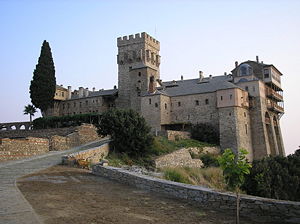
Population
Greece's total population in 2005 was 11,082,752. Statistics from 1971, 1981 and 2001 show the Greek population has been aging the past several decades, with a median age for the total population of 41.2 years. Almost two-thirds of the Greek people live in urban areas. Greeks had an average life expectancy at birth of 79.38 years (76.85 years for males; 82.06 years for females) in 2007.
Ethnicity
Greeks make up 93 percent of the population, while other foreign citizens make up seven percent, according to the 2001 census. The percentage figures represent citizenship, since Greece does not collect data on ethnicity. The Greeks are a nation and ethnic group who have populated Greece and the area of the Aegean Sea for over 3500 years. The Mycenaean proto-Greeks were probably the first historical people to arrive in the area now referred to as 'Greece' (the southern tip of the Balkan peninsula) in the 16th century B.C.E. and the first that can be considered 'Greek' as an ethnic identity. The Greek genetical Tree was constructed revealed homogeneity between Europeans. Median networks revealed that most of the Greek haplotypes are clustered to the five known haplogroups and that a number of haplotypes are shared among Greeks and other European and Near Eastern populations.
The only minority in Greece which receives special treatment is the Muslim minority (Μουσουλμανική μειονότητα) in Thrace, which amounts to approximately 0.95 percent of the total population. Its members are predominantly of Turkish, Pomak and Roma ethnic origins. Other recognized ethnic minorities include approximately 35,000 Armenians and 5500 Jews.
Religion
The constitution of Greece recognizes the Greek Orthodox faith as the "prevailing" religion of the country, while guaranteeing freedom of religious belief for all. The Greek Government does not keep statistics on religious groups and censuses do not ask for religious affiliation. The majority of Greek citizens (98 percent) identify themselves as Greek Orthodox, and most of them celebrate at least the main religious feasts, especially Pascha (Greek Orthodox Easter).
During the centuries of Ottoman domination, besides its spiritual mandate, the Orthodox Church, based in Constantinople (present-day Istanbul), also functioned as an official representative of the Christian population of the empire. The Church is often credited with the preservation of Greek language, values, and national identity during Ottoman times. The Church was also an important rallying point in the war for independence, although this latter position is somewhat controversial as the official Church in Constantinople initially condemned the breakout of armed struggle against the Empire. The Greek Orthodox Church was established shortly after the formation of a Greek national state. Its authority to this day extends only to the areas included in the embryonic Greek state of 1833.
There is a Muslim minority (1.3 percent) concentrated in Thrace, and officially protected by the treaty of Lausanne. Besides Pomaks (Muslim Slavic Speakers) and Roma, it consists mainly of ethnic Turks, who speak Turkish and receive instruction in Turkish at special government-funded schools. There are also a number of Jews in Greece, most of whom live in Thessaloniki. There are also some Greeks who adhere to a reconstruction of the ancient Greek Religion.
In the Eurostat - Eurobarometer poll of 2005, 81 percent of Greek citizens responded that they believe there is a God, whereas 16 percent answered that they believe there is some sort of spirit or life force, and three percent that they do not believe there is a God, spirit, nor life force. Greece's percentage of respondents asserting that they believe there is a God was the third highest among EU members behind Malta and Cyprus.
Language
Greek is the official language and is spoken by 99 percent of the population. It is an Indo-European language that has been used in the region for nearly 4000 years, although it has changed considerably. The ordinary spoken language is known as demotic and the formal version, known as katharevousa, was developed in the eighteenth century. Katharevousa initially spread quickly among political leaders and the intelligentsia, although most turned back to demotic Greek by the twentieth century. Church services are conducted in koine, a form of ancient Greek in which the New Testament is written. There are also regional dialects. English and French are also widely used. The rise of internet-based communication services as well as cell phones have caused a distinctive form of Greek written partially, and sometimes fully in Latin characters has emerged; this is known as Greeklish, a form that has spread across the Greek diaspora and even to the two nations with majority Greek speaking populations, Cyprus and Greece.
Men and women
Rural men and women traditionally shared agricultural tasks, and land and property have long been owned by both men and women. Among those who worked outside the home, women occupied lower-paid positions and stopped working when they had children, altough by the late twentieth century, women constituted 45 percent of the workforce. Traditionally, men took on public roles and women private, although women in attend, cleaned, and maintained churches. Women maintained a key economic role in the family, as well as being mother, wife, and daughter, maintained the household, and became involved in dancing, music, and crafts. Women received full voting rights in 1956, and the Family Law of 1983 established legal gender equality in family relationships and decision making. A total 53 percent of students in universities are women, and the percentage of women in public office has increased.
Marriage and the family
The family is the basic unit of support and identity, and nearly all people marry. Arranged marriages were common but have declined. Marriages are monogamous, and the average age at marriage is the late 20s for women and the mid-30s for men. Marriage rates kept falling from almost 71 per 1000 inhabitants in 1981 until 2002, only to increase slightly in 2003 to 61 per 1000. The divorce rate is among the lowest in Europe, although it has increased from 89.2 per 1000 marriages in 1981 to 191 per 1000 marriages in 2002. Until 1982, all marriages occurred in churches, but civil marriages have been legal since that time. Nuclear family households are the most common, various forms of extended kin arrangements also exist. It is common for elderly parents to join the household of one of their adult children. Regarding inheritance, sons and daughters receive roughly equivalent shares of their parents' wealth. Daughters customarily received their portion at marriage, but the Family Law of 1983 made the practice of dowry illegal, although some property transfer at marriage continues.
Education
Nursery schools and kindergartens are popular but not compulsory. Children start primary school aged six and remain there for six years. Some primary schools are "all-day", offering an extended timetable and enriched syllabus. Attendance at gymnasia starts at age 12 and lasts for three years. Greece's post-compulsory secondary education consists of two school types: unified upper secondary schools and technical-vocational schools, as well as vocational training institutes.
Public higher education is divided into universities, "highest educational institutions" and "highest technological educational institutions". Students are admitted to these institutes according to their performance at national level examinations taking place after completion of the third grade of Lykeio. Additionally, students over 22 years old may be admitted to the Hellenic Open University through a form of lottery.
The Greek education system also provides special kindergartens, primary and secondary schools for people with special needs or difficulties in learning. Specialist gymnasia and high schools offering musical, theological and physical education also exist.
Regarding literacy, 97.5 percent of the total population over the age of 15 could read and write in 2003.
Class
The modern Greek state, the departure of the Ottomans, and the dismantling of agricultural estates, has brought mobility to the class system. Social status results from a combination of wealth, education, occupation, and what is known as philotimo, or one's sense of social responsibility, esteem, and attention to proper behavior. The trappings of wealth convey a high position, as do urban residence, the use of katharevousa, fluent English and French, and the adoption of Western styles.
Culture
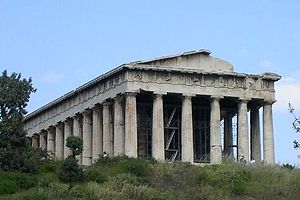
Greek culture evolved over several thousand years, with its earliest known civilization being in the Mycenean and Minoan era, continuing into Classical Greece, the birth of the Hellenistic era and through the influence of the Roman Empire and its Greek Eastern successor the Byzantine Empire. The Ottoman Empire also had a significant influence on Greek culture, but the Greek war of independence is credited for the revitalization Greece and establishing a single [once again] sovereign single entity (though notably smaller), of its multi-faceted culture throughout the ages. Notably Greece is known as "the cradle of Western civilization".
Architecture
Remains of ancient Greek architecture still survive or are well documented today alongside more modern examples. It emphasized a Grecian cross layout, the Byzantine capitol style of column (a mixture of Ionic and Corinthian capitols) and a central dome surrounded by several smaller domes. Greece also experienced something of a Neo-Byzantine revival following the Greek Revolution, and quite unsurprisingly, also experienced a growth in Neo-Classical Architecture in the years following the Revolution; this came into a contact and interaction with traditional Byzantine villa architecture to produce a form specific to modern Greece
Modern Greek architecture has followed the international architecture trends. Like other modern capitals, Athens also has its fair share of Neo-classic, Modernist and Postmodernist architecture. Important Greek and international architects have designed many buildings of Athens such as Dimitris Pikionis, Stamatis Kleanthis, Ernst Ziller, Theophil Freiherr von Hansen, Patroklos Karantinos, Walter Gropius, Eero Saarinen and Mario Botta. Several new buildings were also constructed by Santiago Calatrava for the Athens Olympics of 2004 while Bernard Tschumi has designed the New Acropolis Museum.
Art
In contrast to other illustrated forms, surviving ancient Greek paintings are very rare. Greek painters worked mainly on wooden panels, and their finest works were admired for hundreds of years after their creation. However, these paintings rapidly disappeared after the 4th century AD when they were no longer adequately protected. In addition to sub-standard Roman copies, for example in Pompeii, rare surviving examples have been found in the tombs of the kings of Macedon at Vergina, at Lefcadia also in ancient Macedon, as well as Kazanlak in ancient Thrace.
Surviving examples of the ancient Greek sculpture are more common, particularly the works of the Greek master sculptors, such as Phidias and Praxiteles. These artists and their followers were frequently emulated by the Romans. However, the Christians of the 4th and 5th centuries viewed the destruction of pagan idols as an act of piety. Many ancient marble sculptures were burned to form lime in the Middle Ages, and most bronze statues were melted down for their metal. The marble statues that escaped destruction were spared as they were either buried and forgotten, or in the case of bronzes, lost at sea.
In the Byzantine period, religious art was the dominant theme, with highly-decorated mosaics and icons adorning religious buildings. The Renaissance artist, El Greco (Domenikos Theotocopoulos), responded to Byzantine and 16th century Mannerist art, producing sculpture and paintings with a liberated form, light and colour that inspired 20th century artists such as Pablo Picasso and Jackson Pollock.
Moreover, an important and often pioneering role was played by artists from Ionian islands in the 18th and the beginning of the 19th century, who exploited developments of the Italian Renaissance and baroque ateliers. As efforts persisted with new directions and objectives, Greek artists emerging in the world during the first decades of the 19th century reconnected Greek art with its ancient tradition, as well as with the quests of the European ateliers, especially those of the Munich School, with defining examples of the Greek contemporary art of the period including the work of Theodoros Vryzakis and Nikiphoros Lytras. The British-Greek Marie Spartali became the pre-eminent female artist of the Pre-Raphaelite era.
In the early twentieth century Demetrios Galanis, a contemporary and friend of Picasso, Greece has continued an ancient sculptural tradition well into the Modernist and Post-Modernist eras, with contributors including philosopher Costas Axelos and the more famous Constantine Andreou, recipient of the French Legion of Honor.
Cinema
Cinema first appeared in Greece in 1897 but the first actual theater was built later in 1907. The first production began in 1914 as the Asty Film company was founded and the production of long films begun. Golfo (Γκόλφω), a well known traditional love story, is the first Greek long movie, although there were several minor productions such as newscasts before this point.
The Golden age of Greek cinema is universally considered to be the 1950s - in which production rose to a height of 60 films a year, and in which productions such as Stella, directed by one of Greece's most famous directors Michael Cacoyannis, shot to prominence internationally as well in Greece and Cyprus.
Since this period Greek cinema has been relatively stop and go in its consistency, apart from films such as Loafing and Camoflage (Λούφα και Παραλλαγή), which hit a popular nerve of the continual Greek and Turkish standoffs in the Aegean using comedy. Other political themes touched on in recent film include immigration from Albania, for example "Μετέωρο βήμα του πελαργού, Το" (1991) (in English: The Suspended Step of the Stork) directed by Theo Angelopoulos.
Theo Angelopoulos is widely regarded as one of the greatest cinematographers of our time. He has won a number of international film awards including the Palme d'Or at Cannes in 1998 for his movie (Mia aioniotita kai mia mera).
Clothing
The costumes of Greece are a rich part of a multi-layered cultural history. This is just a brief overview of the subject and will include only a few representative examples of some of the costumes that were worn traditionally by the Greek people. Some characteristics of Greek folk costumes can be traced back to elements in ancient and Byzantine costume; in fact, many of the elements of liturgical clothing worn today by Greek Orthodox priests also a bear relation to modern Greek folk costume, and have their origin in the clothing of the Byzantine Empire.
There are some generalizations that might be proposed about the costumes and their styles and components. The costumes of the mainland and of the islands show differences, but also maintain the standard Foustanella as their basic clothing part. Furthermore, the costumes of each area tend to have several elements in common. While common elements across the country are demonstrable in materials, construction, parts, and designs, smaller regions also share certain distinct regional characteristics. For example, costumes can be identified as being from Epiros, or Mesogeia, or Makedonia; however, the identification of costumes can be also be narrowed to smaller areas within these broader geographical and cultural areas. A costume's village can be identified by individual features such as the shape of a costume part, or the colors or the embroidery designs used. This is also true with respect to the various costumes worn by Greeks of the islands, and beyond, across the regions of Greece.
Cuisine
Main article: Greek cuisine

Greek cuisine is often cited as an example of the healthy Mediterranean diet. The cuisine of Greece has influences from Italian, Balkan and Middle Eastern cuisine. Greek cuisine incorporates fresh ingredients into a variety of local dishes such as moussaka, stifado and spanakopita. Throughout Greece people often enjoy eating from small dishes such as meze with various dips such as tzatziki, grilled octopus and small fish, feta cheese, dolmades (rice, currants and pine kernels wrapped in vine leaves), various pulses, olives and cheese. Olive oil is added to almost every dish. Sweet desserts such as galaktoboureko, and drinks such as ouzo, metaxa and a variety of wines including retsina.
It must be noted however, that Greek cuisine difers widely from different parts of the mainland and from Island to Island. Cyprus in particular, has many delicacies that are native to it alone, such as grilled Halloumi and Louvi.
Dance
Greece has a continuous history of native dances reaching from antiquity till the modern era. It began in the Minoan period. Ancient Greeks believed that dancing was invented by the gods and therefore associated it with religious ceremony. They believed that the gods offered this gift to select mortals only, who in turn taught dancing to their fellow-men.
Byzantine instruments included the guitar, single, double or multiple flute, sistrum, timpani (drum), psaltirio, Sirigs, lyre, cymbals, keras and kanonaki.
Popular dances of this period included the Syrtos, Geranos, Mantilia , Saximos, Pyrichios, and Kordakas . Some of these dances have their origins in the ancient period and are still enacted in some form today.
Greece is one of the few places in Europe where the day-to-day role of folk dance is sustained. Rather than functioning as a museum piece preserved only for performances and special events, it is a vivid expression of everyday life. Occasions for dance are usually weddings, family celebrations, and paneyeria (Patron Saints' name days). Dance has its place in ceremonial customs that are still preserved in Greek villages, such as dancing the bride during a wedding and dancing the trousseau of the bride during the wedding preparations. The carnival and Easter offer more opportunities for family gatherings and dancing. Greek taverns providing live entertainment often include folk dances in their program.
Regional characteristics have developed over the years because of variances in climatic conditions, land morphology, and people's social lives. In later years, wars, international pacts and consequent movement of populations, and even movements of civil servants around the country, intermingled traditions. People learned new dances, adapted them to their environment, and included them in their feasts. Kalamatianos and Tsamikos are considered panhellenic dances and are danced all over the world in diaspora communities. Others have also crossed boundaries and are known beyond the regions where they originated; these include theKaragouna from Thessaly, the Pentozalis from Crete, the Zonaradikos from Thrace, the Tik from Pontos, and the Balos from the Aegean Islands.
The avant-garde choreographer, director and dancer Dimitris Papaioannou was responsible for the critically successful Opening Ceremony of the 2004 Olympic Games, with a conception that reflected the classical influences on modern and experimental Greek dance forms.
Literature
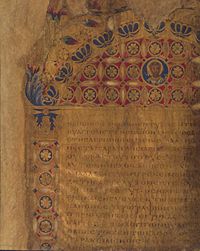
Greece has a remarkably rich and resilient literary tradition, extending over 2800 years and through several eras. The Classical era is that most commonly associated with Greek Literature, beginning in 800 B.C.E. and maintaining its influence through to the beginnings of Byzantine period, whereafter the influence of Christianity began to spawn a new development of the Greek written word.
The first recorded works in the western literary tradition are the epic poems of Homer and Hesiod. Early Greek lyric poetry, as represented by poets such as Sappho and Pindar, was responsible for defining the lyric genre as it is understood today in western literature. Aesop wrote his Fables in the 6th century B.C.E.
The many elements of a millennia-old tradition are reflected in Modern Greek literature, including the works of the Nobel laureates Odysseus Elytis and George Seferis. Moving into the twentieth century, the modern Greek literary tradition spans the work of Constantine P. Cavafy, considered a key figure of twentieth century poetry, Giorgos Seferis (whose works and poems aimed to fuse the literature of Ancient and Modern Greece) and Odysseas Elytis, both of whom won the Nobel Prize for Literature. Nikos Kazantzakis is also considered a dominant figure, with works such as The Last Temptation of Christ and The Greek Passion receiving international recognition. Vassilis Vassilikos is widely translated.
Music
Greece has a diverse and highly influential musical tradition, with ancient music influencing the Roman Empire, and Byzantine liturgical chants and secular music influencing the Renaissance. Modern Greek music combines these elements, as well as influences from the Middle East, to carry Greeks' interpretation of a wide range of musical forms.
The history of music in Greece begins once more, as one might expect, with the music of ancient Greece, largely structured on the Lyre and other supporting string instruments of the era. The well-known structural legacies of the Pythagorean scale, and the related mathematical developments it upheld helped to define western classical music.
A range of domestically and internationally known composers and performers across the musical spectrum have found success in modern Greece, while traditional Greek music is noted as a mixture of influences from indigenous culture with those of west and east. Turkish and Ottoman elements can be most clearly heard in the traditional songs, dhimotiká, as well as the modern bluesy rembétika music. The best-known Greek musical instrument is the bouzouki. "Bouzouki" is a descriptive Turkish name, but the instrument itself is in fact of Greek rather than Turkish origin. It derives from the ancient Greek lute known as the pandoura, a kind of guitar, clearly visible in ancient statues, especially female figurines of the "Tanagraies" playing cord instruments.
Famous present-day Greek musicians include the central figure of 20th century European modernism Iannis Xenakis, a composer, architect and theorist. Maria Callas, Mikis Theodorakis, Dimitris Mitropoulos, Manos Hadjidakis, and Vangelis also lead twentieth-century Greek contributions, alongside Nikos Skalkottas, Demis Roussos, Nana Mouskouri, Rotting Christ and Anna Vissi.
Philosophy
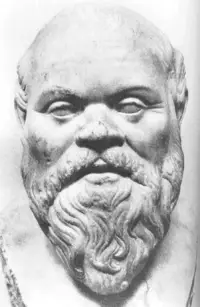
Herodotus and Thucydides are often attributed with developing the modern study of history into a field worthy of philosophical, literary, and scientific pursuit. Polybius first introduced into study the concept of military history. Philosophy entered literature in the dialogues of Plato, while his pupil Aristotle, in his work the Poetics, formulated the first set criteria for literary criticism. Both these literary figures, in the context of the broader contributions of Greek philosophy in the Classical and Hellenistic eras, were to give rise to idea of Political Science, the study of political evolution and the critique of governmental systems.
Science and technology
The Greek world is widely regarded as having given birth to scientific thought by means of observation, thought, and development of a theory without the intervention of a supernatural force. Thales, Anaximander and Democritus were amongst those contributing significantly to the establishment of this tradition. It is also, and perhaps more commonly in the western imagination, identified with the dawn of Western Philosophy, as well as a mapping out of the Natural Sciences. Greek developments of mathematics continued well up until the decline of the Byzantine Empire. In the modern era Greeks continue to contribute to the fields of Science, Mathematics and Philosophy.
In medicine, doctors still refer to the Hippocratic oath, instituted by Hippocrates, regarded as foremost in laying the foundations of medicine as a science. Galen built on Hippocrates' theory of the four humours, and his writings became the foundation of medicine in Europe and the Middle East for centuries. The physicians Herophilos and Paulus Aegineta were pioneers in the study of anatomy, while Pedanius Dioscorides wrote an extensive treatise on the practice of pharmacology.
Greeks continue to contribute to science and technology in the modern world. John Argyris, a Greek mathematician and engineer, is responsible for the invention of finite element analysis and the direct stiffness method, relative to physics. Mathematician Constantin Carathéodory worked in the fields of real analysis, the calculus of variations, and measure theory in the early 20th century, and went on to assist Albert Einstein in the mathematical part of his theory of relativity. Biologist Fotis Kafatos pioneers in the field of molecular cloning and genomics; Dimitris Nanopoulos is a noted theoretical physicist, having made significant contributions to the fields of particle physics and cosmology. In medicine, Georgios Papanikolaou contributed heavily to the development of cancer screening with his Pap smear. The Greek car designer Alec Issigonis created the iconic Mini automobile, while the computer scientist Michael Dertouzos was amongst the pioneers of the internet. Nicolas Negroponte chairman of the Massachusetts Institute of Technology Media Lab is one of the founders of the program One Laptop Per Child, a non-profit organisation aiming to extend Internet access in developing countries.
Theatre
Classical Greece is also judged the birthplace of theatre. Aeschylus introduced the ideas of dialogue and interacting characters to playwriting and in doing so, he effectively invented "drama": his Oresteia trilogy of plays is judged his crowning achievement. Other refiners of playwriting were Sophocles and Euripides. Aristophanes, a comic playwright, defined and shaped the idea of comedy as a theatrical form.
Sports
The Greek national football team is the reigning UEFA European Champions having won the EURO 2004.[1] In the final, the team managed to beat their Portuguese opponents by 1-0.[1] They are as of March ranked 15th in the world,[2] and are currently first in their 2008 UEFA European Football Championship qualifying group. The Greek Super League is the highest professional football league in the country. Currently sixteen clubs compete in that league, playing each other twice, once at home and once away. At the end of each season, the bottom three clubs are relegated to the Second National League only to be replaced by the top three teams from that particular league. The top three most known football clubs are Panathinaikos, Olympiacos, and AEK Athens.
The men's Greek national basketball team actually is more successful with a decades-long tradition of excellence. Greece is generally considered an important power in international basketball and the national team is regarded as one of the best in the world. They have won the European Championship twice, once in 1987 and again in 2005,[3] and have reached the final four in three of the last four FIBA World Championships (1994, 1998, 2006) taking second place in 2006. They currently are ranked 5th in the world.[4] The domestic Greek basketball league, A1 Ethniki is composed of fourteen teams. The most successful Greek teams are Panathinaikos, Aris Salonica, Olympiacos, AEK Athens and PAOK.
ReferencesISBN links support NWE through referral fees
- Dagtoglou, P.D. (1991). "Protection of Individual Rights", Constitutional Law — Individual Rights — Volume I (in Greek). Athens-Komotini: Ant. N. Sakkoulas Publishers.
- Mavrias, Kostas G. (2002). Constitutional Law (in Greek). Athens: Ant. N. Sakkoulas Publishers. ISBN 9-60150-663-2.
- (2004) The Constitution of Greece. Athens: Hellenic Parliament. ISBN 9-605-60073-0. Retrieved 2007-09-20.
- Venizelos, Evangelos (2002). "The Contribution of the Revision of 2001", The "Acquis" of the Constitutional Revision (in Greek). Athens: Ant. N. Sakkoulas Publishers. ISBN 9-60150-617-9.
- Richard Clogg, A Concise History of Greece, Second Edition, Cambridge University Press 2002
- Minorities in Greece - historical issues and new perspectives. History and Culture of South Eastern Europe. An Annual Journal. München (Slavica) 2003.
- 2007 Greek forest fires
External links
- Greece World Fact Book 2007, accessed November 22, 2007.
- Culture of Greece Countries and Their Cultures Ge-It, accessed November 25, 2007.
- Greece Encyclopaedia Britannica Online, accessed November 22, 2007.
Government
- President of the Hellenic Republic (English)
- Prime Minister of the Hellenic Republic (English)
- Hellenic Parliament (English)
- Greek News Agenda Newsletter
- Greece — information and links related to Greece from the ministry of foreign affairs
- Greek missions abroad (embassies, consulates, representations)
- Foreign missions in Greece
- Greek National Tourism Organisation
- National Statistical Service of Greece
Other
- Encyclopaedia Britannica - Greece's country page
- Hellenic History
- The Greek Heritage
- Open Directory Project: Greece
- Chronology of Greece from the World History Database
- History of Greece: Primary Documents
- Greek Political Structure
- Historical Reconstruction of Greek Pankration
- Greek Council for Refugees
| Topics about Ancient Greece | |
|---|---|
| Places | Aegean Sea • Hellespont • Macedon • Sparta • Athens • Corinth • Thebes • Thermopylae • Antioch • Alexandria • Pergamon • Miletus • Delphi • Olympia • Troy |
| Life | Agriculture • Art • Cuisine • Economy • Law • Medicine • Paideia • Pederasty • Pottery • Prostitution • Slavery • Technology • Olympic Games |
| Philosophers | Pythagoras • Heraclitus • Parmenides • Protagoras • Empedocles • Democritus • Socrates • Plato • Aristotle • Zeno • Epicurus |
| Authors | Homer • Hesiod • Pindar • Sappho • Aeschylus • Sophocles •
Euripides • Aristophanes • Menander • Herodotus • Thucydides • Xenophon • Plutarch • Lucian • Polybius • Aesop |
| Buildings | Parthenon • Temple of Artemis • Acropolis • Ancient Agora • Arch of Hadrian • Temple of Zeus at Olympia • Colossus of Rhodes • Temple of Hephaestus • Samothrace temple complex |
| Chronology | Aegean civilization • Minoan Civilization • Mycenaean civilization • Greek dark ages • Classical Greece • Hellenistic Greece • Roman Greece |
| People of Note | Alexander The Great • Lycurgus • Pericles • Alcibiades • Demosthenes • Themistocles |
| Art and Sculpture | Kouroi • Korai • Kritios Boy • Doryphoros • Statue of Zeus • Discobolos • Aphrodite of Knidos • Laocoön • Phidias • Euphronios • Polykleitos • Myron |
| Geographic locale | |||||||||
|
Countries of Europe
Albania · Andorra · Armenia2 · Austria · Azerbaijan1 · Belarus · Belgium · Bosnia and Herzegovina · Bulgaria · Croatia · Cyprus2 · Czech Republic · Denmark3 · Estonia · Finland · France3 · Georgia1 · Germany · Greece · Hungary · Iceland · Ireland · Italy · Kazakhstan1 · Latvia · Liechtenstein · Lithuania · Luxembourg · Republic of Macedonia · Malta · Moldova · Monaco · Montenegro · Netherlands3 · Norway3 · Poland · Portugal · Romania · Russia1 · San Marino · Serbia · Slovakia · Slovenia · Spain3 · Sweden · Switzerland · Turkey1 · Ukraine · United Kingdom3 · Vatican City 1 Has majority of its territory in Asia. 2 Entirely in Asia but having socio-political connections with Europe. 3 Has dependencies or similar territories outside Europe.
| |||||||||
| Greece in the European Union |
{{Template group |title = International membership |list =
| North Atlantic Treaty Organisation (NATO) | |
|---|---|
| Belgium | Bulgaria | Canada | Czech Republic | Denmark | Estonia | France | Germany | Greece | Hungary | Iceland | Italy | Latvia | Lithuania | Luxembourg | The Netherlands | Norway | Poland | Portugal | Romania | Slovakia | Slovenia | Spain | Turkey | United Kingdom | United States of America | |
| Organisation for Economic Co-operation and Development (OECD) | OECD logo |
|---|---|
| Australia | Austria | Belgium | Canada | Czech Republic | Denmark | Finland | France | Germany | Greece | Hungary | Iceland | Ireland | Italy | Japan | South Korea | Luxembourg | Mexico | Netherlands | New Zealand | Norway | Poland | Portugal | Slovakia | Spain | Sweden | Switzerland | Turkey | United Kingdom | United States | |
Albania · Angola · Antigua and Barbuda · Argentina · Armenia · Australia · Austria · Bahrain · Bangladesh · Barbados · Belize · Benin · Bolivia · Botswana · Brazil · Brunei (Brunei Darussalam) · Burkina Faso · Burundi · Cambodia · Cameroon · Canada · Central African Republic · Chad · Chile · China (PRC) · Colombia · Democratic Republic of the Congo · Republic of the Congo · Costa Rica · Cote d'Ivoire · Croatia · Cuba · Djibouti · Dominica · Dominican Republic · Ecuador · Egypt · El Salvador · European Union¹ · Former Yugoslav Republic of Macedonia (FYROM) · Fiji · Gabon · The Gambia · Georgia · Ghana · Grenada · Guatemala · Guinea · Guinea-Bissau · Guyana · Haiti · Honduras · Hong Kong² · Iceland · India · Indonesia · Israel · Jamaica · Japan · Jordan · Kenya · South Korea · Kuwait · Kyrgyzstan · Lesotho · Liechtenstein · Macau² · Madagascar · Malawi · Malaysia · Maldives · Mali · Mauritania · Mauritius · Mexico · Moldova · Mongolia · Morocco · Mozambique · Myanmar · Namibia · Nepal · New Zealand · Nicaragua · Niger · Nigeria · Norway · Oman · Pakistan · Panama · Papua New Guinea · Paraguay · Peru · Philippines · Qatar · Rwanda · St. Kitts and Nevis · St. Lucia · St. Vincent and the Grenadines · Saudi Arabia · Senegal · Sierra Leone · Singapore · Solomon Islands · South Africa · Sri Lanka · Suriname · Swaziland · Switzerland · Separate Customs Territory of Taiwan, Penghu, Kinmen, and Matsu · Tanzania · Thailand · Togo · Trinidad and Tobago · Tunisia · Turkey · Uganda · United Arab Emirates · United States · Uruguay · Venezuela · Vietnam · Zambia · Zimbabwe
- All twenty-seven member states of the European Union are also members of the WTO in their own right: Austria • Belgium • Bulgaria • Cyprus • Czech Republic • Denmark • Estonia • Finland • France • Germany • Greece • Hungary • Ireland • Italy • Latvia • Lithuania • Luxembourg • Malta • Netherlands and Netherlands Antilles • Poland • Portugal • Romania • Slovakia • Slovenia • Spain • Sweden • United Kingdom.
- Special Administrative Region of the People's Republic of China.
Template:Black Sea Economic Cooperation countries
| Member states and observers of La Francophonie | |
|---|---|
| Members | Albania · Andorra · Belgium (French Community) · Benin · Bulgaria · Burkina Faso · Burundi · Cambodia · Cameroon · Canada (New Brunswick • Quebec) · Cape Verde · Central African Republic · Chad · Cyprus1 · Comoros · Democratic Republic of the Congo · Republic of the Congo · Côte d'Ivoire · Djibouti · Dominica · Egypt · Equatorial Guinea · Former Yugoslav Republic of Macedonia · France (including French Guiana • Guadeloupe • Martinique • St. Pierre and Miquelon) · Gabon · Ghana1 · Greece · Guinea · Guinea-Bissau · Haiti · Laos · Luxembourg · Lebanon · Madagascar · Mali · Mauritania · Mauritius · Moldova · Monaco · Morocco · Niger · Romania · Rwanda · St. Lucia · São Tomé and Príncipe · Senegal · Seychelles · Switzerland · Togo · Tunisia · Vanuatu · Vietnam |
| Observers | |
Credits
New World Encyclopedia writers and editors rewrote and completed the Wikipedia article in accordance with New World Encyclopedia standards. This article abides by terms of the Creative Commons CC-by-sa 3.0 License (CC-by-sa), which may be used and disseminated with proper attribution. Credit is due under the terms of this license that can reference both the New World Encyclopedia contributors and the selfless volunteer contributors of the Wikimedia Foundation. To cite this article click here for a list of acceptable citing formats.The history of earlier contributions by wikipedians is accessible to researchers here:
- Greece history
- Geography_of_Greece history
- Politics_of_Greece history
- Demographics_of_Greece history
- Greeks history
- Culture_of_Greece history
The history of this article since it was imported to New World Encyclopedia:
Note: Some restrictions may apply to use of individual images which are separately licensed.
- ↑ 1.0 1.1 McNulty, Phil, "Greece win Euro 2004", BBC News, news.bbc.co.uk, 2004-07-04. Retrieved 2007-05-07.
- ↑ FIFA World Rankings. FIFA. www.fifa.com (April 2007). Retrieved 2007-05-07.
- ↑ Wilkinson, Simon, "Greece tops Germany for Euro Title", ESPN, sports.espn.go.com, 2005-09-26. Retrieved 2007-05-07.
- ↑ FIBA World Rankings. FIBA. www.fiba.com (2007). Retrieved 2007-05-07.

